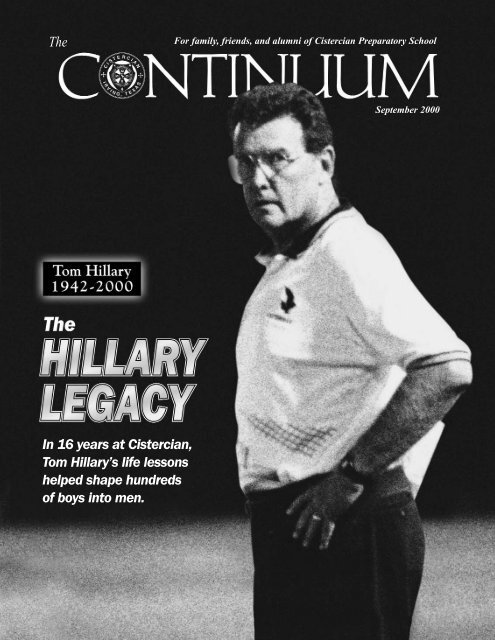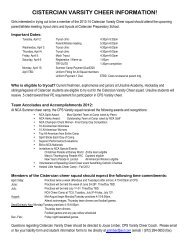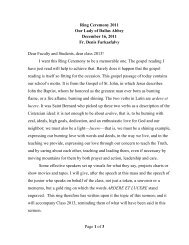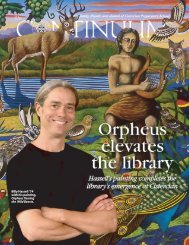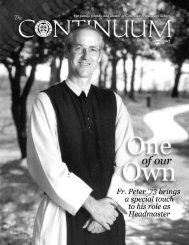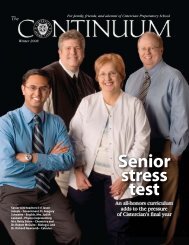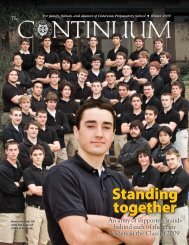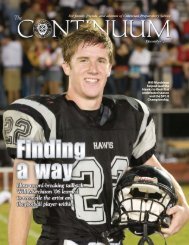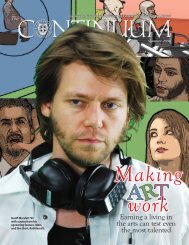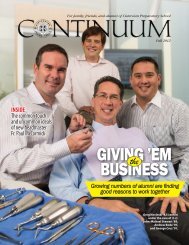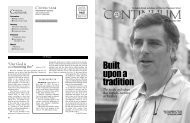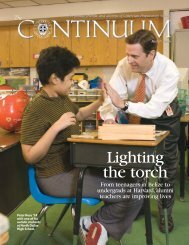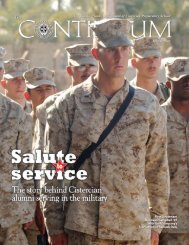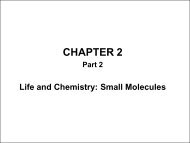September 2000: "The Hillary Legacy" - Cistercian Preparatory School
September 2000: "The Hillary Legacy" - Cistercian Preparatory School
September 2000: "The Hillary Legacy" - Cistercian Preparatory School
Create successful ePaper yourself
Turn your PDF publications into a flip-book with our unique Google optimized e-Paper software.
K. Pomorski and K. Dietrich: Derivation of a Proximity Interaction 357corresponding energy density ~are given by:tance Rle=LR1-R21 (see Fig. 2):E =~d3xJfEp,, pp, %, Zp, J,,Jp] (2.1)h 2+ l(t 1 + t2) pz + ~(t 2-tl)(p~ z, + ppzp)+ ~66(t2 - 3 tl)p A p +3~2(3 t 1 + t2)(p,A p, + ppA p,)+ 88 0, p + - +-89 w.(pv.J + p,v.J, +(2.2t<strong>The</strong> densities (p~, pp, p), the kinetic densities (%, Zp, z)and the spin densities (J,,Jp,J) are defined in termsof the single particle functions ~bl "), ~bl p) of neutronsand protons by:Atp,(x) = ~ I~bl'~ 2 (2.3)i=1Zp (x) = 2 (2.3')i=1p (x) = p, (x) + p p (x) (2.3")N~,(x) = ~, IV ~Ol")(x)l 2 (2.4)i=1Zzp(x)= Z ]V(blP)(x)I 2i=1(2.4')z (x) = z, (x) + zp (x) (2.4")J,(x)=-i~Ni=1Z~(")*trl , ,a)(Vq~l')(r,a')x(alala')) (2.5)-Jp(x) = --i ~ qOlP)* (r , a)(VcrplV)(r, a')(al a I(r'))i=1(2.5')J (x) = ~r (x) + Jp (x). (2.5")<strong>The</strong> set of parameters to, tl, t~_, t3, x and W (referredto as "Skyrme parameters") defines the effective interaction.Different Skyrme forces are distinguishedby different sets of parameters (see Table 1 andRef. 5). As already discussed in w 1, the densities (2.3-2.5) depend parametrically on the constraints whichimply that there are two spherical nuclei with givennumbers of neutrons and protons at a given distanceR~2. Whenever this distance is larger than the sum ofthe liquid drop radiiR12~RLD+R LD (2.6)we expect that the "polarization" of the unperturbeddensity distributions is small. Consequently, we makethe "Ansatz" that the total density p is a sum of twospherical Fermi distributions (radii/~,/~2) at a dis-p(x)= pa (IX- R11) + pz(IX- R21) (2.7)p o-(IX- R,~I)a=(1, 2)and that the neutron densities p.,~ and proton densitiespp,~ for the two interacting nuclei differ fromp~ by scaling factors only:p,,~.=~p~ (2.91Z~pp,~: =~p~.1 (2.11)p,,o =~(1 +I~)p~pp,~=89 -I~)p~(2.11'),On =,On1 + Pn2 (2.12)Pp =Ppl +Pp2"(2.12')Using the Thomas-Fermi approximation [6J, we expressthe kinetic density z,(zp) of neutrons (protons)by the neutron (proton) density p,(pp):7-c4/3 35/3 05/3 =cgps/3(x )z.(x)= 3 (2.13)cd = 5.7424(2.13')zp (x) = cg pSv/3 (x). (2.14)Decomposing the total neutron (proton) densityp,(pp) into the parts originating from the two nucleiaccording to (2.12) ((2.12')) we find75nZ"fnl "~- 75n25/3 1 -5/3%o=Cgp,~ =oK. [~(1 +io)]5/3 PaTp =Tpl-~Tp2z,o = cg p~? = (d [89 -I~)] 5/3 p~/3.(2.9')<strong>The</strong> vectors R~ point from the origin of the coordinatesystem to the centre of the distribution p,. <strong>The</strong>parameters N~, Z~, A~ represent the number of neutrons,protons and nucleons in nucleus a(= 1, 2) respectively.Choosing the nucleon numbers A~ and the thirdcomponents T3 (') of the isospinT(3~ )-N~-Z~2 =~-.A~I~ (2.10)as independent variables, we have(2.15)(2.15')(2.16)(2.16')
<strong>The</strong>His lessons of caring, loyalty,and humility turned <strong>Cistercian</strong>athletes into winners on and offthe gridiron • By David Stewart ’744SOME OFyou talking outside myoffice,” Coach Tom“IOVERHEARD<strong>Hillary</strong> said as he eyed hisfirst team of <strong>Cistercian</strong>players in August of1984. At 6'6" and 240 pounds, this monumentof a man commanded their attentioneffortlessly. More than a very fitlookingcoach, he stood with the presenceof a player, a real player.“You were saying, ‘We’ll lose to<strong>The</strong> CONTINUUM
Dallas Christian, Trinity Valley will betough, we’ll beat Fort Worth Christian,Greenhill is too strong …’”David Patrick ’86, a junior that year,remembered embarrassed looks allaround. “He didn’t name any names,”Patrick recalled. “He didn’t have to. Weall had expressed those same feelings atone time or another.”“<strong>The</strong> <strong>Cistercian</strong> Hawks,” Coach<strong>Hillary</strong> said forcefully, as if hiswords could turn back a tide ofdoubts, “do not go into any footballgame thinking they can’t win.”As the weeks wore on, thesewords would be reinforced withdeeds. Consistently. Coach <strong>Hillary</strong>,the boys began to believe, was incapableof uttering a hollow word.Photo by Mark Cochran ’97“We knew he was the real dealfrom our first meeting,” said KevinSpencer ’85, a team captain duringthe 1984 season.“He made a point of meeting withthe seniors prior to summer practices,”said Spencer, now a Dallasattorney and president of the<strong>Cistercian</strong> Alumni Association. “Hewanted to know how we felt aboutthe upcoming year, what our goalswere. He asked us what we wantedout of our last season of football.”<strong>The</strong> message: This is your team, seniors;I expect you to lead it. <strong>The</strong>louder, though unspoken message:I believe in you.Members from fifteen more seniorclasses would be given the samecharge. <strong>The</strong>se messages formed theessence of Coach <strong>Hillary</strong>’s coachingphilosophy. He strived to shape boysinto men by trusting them and givingthem a chance to lead. Coach <strong>Hillary</strong>’sgoals transcended football seasons andreached into boys’ lives. <strong>The</strong> fieldserved as the classroom for these lifelessons; Coach <strong>Hillary</strong> served as bothteacher and textbook.“I think the most important leadershiptrait that Coach taught andthat made him so special was howmuch he cared for each and everyoneof us,” said Chris Carlson ’85, a captainof the 1984 team and a graduateof the United States Naval Academy.“Coach <strong>Hillary</strong> cared so much forhis players that you did not want tomake a mistake, not because hewould yell or scream, but because hewas giving his best and you wantedto do the same,” he added.Robert Schoenvogel ’96, a captainduring the ’95 season, said, “His consistentlyoutstanding example as acoach gave us a model to follow.Whether at the beginning of two-adaysor during the last minute of thebig game, Coach <strong>Hillary</strong> was the samecoach, and this was what made him sospecial. He towered above everythingand never wavered. I was an EagleScout,” added this 1996 DaveyO’Brien Award recipient and recentgraduate from the University ofVirginia, “but Coach <strong>Hillary</strong> probablytaught me more about leadership thanmy six years in the Boy Scouts.”“<strong>The</strong> lessons he taught, the characterhe instilled, the leadership heportrayed were far more importantthan the fact that we went 6-4 andwon a playoff game,” echoed ArmyMajor Tim Bock ’85, another one ofthe captains during Coach <strong>Hillary</strong>’sfirst year at CPS. “He helped medevelop into what I am today.”<strong>The</strong> implications of Coach’s trust inhis seniors did not escape them. “Hetaught me the ability to have faith inmyself, while having the strength torely on others,” Spencer said.Coach <strong>Hillary</strong>’s commitment toshaping leaders and his unconditionaltrust in them spawned strong relationshipsthroughout his teams. Respectspread from the coach to the seniors,and from the seniors to underclassmen.What <strong>Cistercian</strong> teams lacked insize, speed, and talent, they made upfor in confidence, leadership, and teamchemistry. <strong>Hillary</strong>’s Hawks enteredevery game believing they could win.FOR TOM HILLARY,there just wasn’t enoughtime in the day to satisfyhis hunger for athleticcompetition. He lovedthe thrill of competing,and he loved to win. But at SMU inthe early sixties, <strong>Hillary</strong> learnedabout winning the hard way.Recruited out of Houston’sBellaire High <strong>School</strong> by SMU HeadCoach Bill Meek, <strong>Hillary</strong> received ascholarship to play quarterback in1961. <strong>Hillary</strong> joined a talented classof players that included another quarterbacknamed Jerry Rhome and alineman named Mike Bulger.On the heels of an 0-9-1 record in1961 and a 2-7-1 finish in 1962,Coach Meek lost his job. Most membersof <strong>Hillary</strong>’s recruiting class wereencouraged to move on before the’63 season to free up scholarships forthe new coach, Hayden Fry. (JerryRhome moved on to Tulsa where heset NCAA passing records and wasdrafted in 1965 by the DallasCowboys.)<strong>Hillary</strong> decided to stay at SMUbut expected to concentrate primarilyon baseball, his first love, and basketball,under legendary coach E.O.“Doc” Hayes. But Coach Fry needed<strong>Hillary</strong>’s athleticism and he turnedhim into a tight end and defensiveend. <strong>Hillary</strong> started at both positionsduring his junior and senior seasons.<strong>The</strong> demands of football under Fryforced him to give up basketball.<strong>Hillary</strong> became fast friends withfellow recruit Mike Bulger, who also<strong>September</strong> <strong>2000</strong> 5
stayed on under Fry. During the earlysixties, Bulger’s father was an officerfor the Immigration andNaturalization Service. He was workingwith a number of Hungarian émigrésincluding Fr. Denis Farkasfalvy(Fr. Abbot) and Fr. Bernard Marton.This <strong>Cistercian</strong> connection wouldinfluence Bulger years later to enrollhis son Brent at <strong>Cistercian</strong> (he graduatedin 1983). Bulger also would goon to coach football part-time at<strong>Cistercian</strong> for many years underCoaches Cahill, Haaser, and <strong>Hillary</strong>.In baseball, <strong>Hillary</strong> initiallyplayed first base and then shortstop.It is rare for a man of <strong>Hillary</strong>’sstature to play the shortstop position,which requires the utmost in agilityand quickness. He might well havebeen the tallest shortstop in the historyof the Southwest Conference.After college, <strong>Hillary</strong> would spend acouple of years in the Chicago Cubsorganization.In football, <strong>Hillary</strong> learned a lotabout playing the game and coachingthe game. Despite being undermanned,Hayden Fry’s Mustangscompeted against nationally rankednon-conference teams, includingUSC, Michigan, and Navy. <strong>The</strong>Southwest Conference was, in thosedays, one of the toughest in the country.Nearly every game was close, butSMU finished 2-9 and 3-8 in 1963and 1964, respectively.Matched against formidable opponentsweek after week, Fry relied ona variety of motivational tactics toboost his team’s confidence. Coach<strong>Hillary</strong> particularly liked a poem thatCoach Fry used on occasions whenhis team was facing a bigger, faster,more talented team (see box). Aftercollege, <strong>Hillary</strong> would continue toabsorb Fry’s wisdom for a couple ofyears as an assistant.SMU gave Tom <strong>Hillary</strong> a chanceto compete in the three sports heloved and provided him a feel forhow Division I sports programs operate.Perhaps most importantly, helearned to live by a Henry WardBeecher quote that was featured inthe sports section of the 1963 SMUyearbook, Rotunda: “Victories thatare easy are cheap. Those only areworth having come as the result ofhard fighting.”DURING THESUMMERof 1989, Coach <strong>Hillary</strong>met with his seniors todiscuss the comingseason. Nearly 70 percentof the startersfrom the previous year had been lostto graduation or injury. Although healways preached confidence, herebefore practices began, he was honestwith the team’s leaders.According to John DiPasquale ’90,one of the ’89 captains, <strong>Hillary</strong>expressed to them “a slight hint ofreservation” about the team’sprospects. But this did not alter hisexpectations for his seniors. “Lead theteam to perform its best,” he said.“He also expressed his commitmentnot to use the season as simplya rebuilding year but to go all out tobeat the odds that were stackedagainst us,” DiPasquale recalled.“After those conversations in thesummer, I never heard him talk aboutour weaknesses again, only ourstrengths. It was his belief in us thatkept us together as a team during oneof the toughest seasons that<strong>Cistercian</strong> has ever had.”“We wanted to play for him,”SMU’s lastthree-sport lettermanCoach <strong>Hillary</strong> is pictured here as a sophomore basketballplayer, a freshman quarterback, and a seniorshortstop. <strong>Hillary</strong> started at tight end and defensive endfor the Mustangs during his junior and senior years.Photos courtesyof Mike Bulger6<strong>The</strong> CONTINUUM
It’s all in the state of mind<strong>The</strong> following poem has been a staple for <strong>Cistercian</strong> footballplayers since Mike Bulger, as an assistant under Coach Cahill, introducedit to the team in the seventies. Under Coach <strong>Hillary</strong>, eachfreshman recited the lines during the annual pool party marking theend of two-a-days. Hayden Fry introduced Bulger and <strong>Hillary</strong> to thelines when they were teammates at SMU.IF YOU THINK you are beaten … you are.If you think that you dare not … you don’tIf you think that you’d like to win but feel that you can’tIt’s almost a cinch that you won’tFor out in this world you will find that success beginswith a fellow’s will.It’s all in the state of mind.YES, MANY A RACE IS LOST before ever a step is run,And many a coward falls before his work is begunThink big and your deeds will riseThink small and you will fall behindThink that you can, and you willFor it is all in the state of mind.IF YOU THINK you are outclassed … you are.You’ve got to think high to rise.You’ve got to know that you can before you’ll ever win a prize.Life’s battles don’t always go to the bigger or stronger manBut sooner or later the man who wins is the man who thinks he can.remembered Chris Stewart ’91, a juniorduring the 1989 season who wouldserve as a captain the following year.“Why? Because he invested so muchin us. I remember wondering why hedid that. I mean, he could see in theoff-season, when we would go in thereto lift weights, that none of us werefootball players.”“During that 2-8 season I think wewere upset more for him than forourselves when we lost. It was simple:We did not want to let him downbecause he was so dedicated to us.”“I remember every MondayCoach <strong>Hillary</strong> would give us the synopsison the upcoming team,”Stewart recalled. “Always theupcoming opponent was — incoach’s words — bigger, stronger,faster and more talented. He wouldstate, ‘We play these guys 10 times,we win two... let’s make it one ofthose two.’ Not great odds, but Iremember always feeling as if wehad a chance.”Only rarely did Coach <strong>Hillary</strong> losehis temper during that trying season.DiPasquale recalls one instance inparticular, during a game against amuch larger and more talentedHouston Episcopal team.“<strong>The</strong>y were running all over usand beating us by over 30 points atthe half. During halftime, Coach laidinto us as I had never seen beforebecause he knew we could do better.We played them close to even in thesecond half. It was the best half offootball we played that year.”“After the game, Coach came up tome in the trainer’s room as I was lyingthere in complete exhaustion,”DiPasquale said. “He told me howproud he was of how we played.”Although the losses began to stackup that season, “we never once gotdown on ourselves,” said DiPasquale,now a Captain in the U.S. Air Force,controlling Global Positioning System(GPS) navigation satellites inColorado Springs. “Coach taught mehow to lead in difficult circumstances,and those lessons have served me wellever since.”Coming into the final game of theseason, the Hawks had earned justone victory in nine games. “<strong>The</strong>rewas no way he was going to let uslose that last game against T.M.I.,”Stewart said. “It was Homecoming.”For the occasion, Coach <strong>Hillary</strong>altered his normal Monday synopsis.“We play these guys once,” hetold the team. “We win once.”“He made it clear that there was noother option,” said Stewart. “When wecame in the locker room on Fridaybefore the game, there were flyers oneveryone’s locker that read in big letters,‘WE WILL WIN.’ <strong>The</strong>re wasabsolutely no question in our mindsthat we were going to win that game,even if we were overmatched onpaper. And we did. Coach instilled thatconfidence in us and it carried over tothe next year.” <strong>The</strong> Hawks would sufferthrough just one other losing seasonduring Coach <strong>Hillary</strong>’s tenure.“We played for him,” emphasizedStewart, “and he coached for us.”NEVER leave<strong>Cistercian</strong> because I ama Hawk,” Wyatt“IWOULD Maxwell ’00 rememberedCoach tellingsome of the seniors thisyear. “I am one of you. I wear thatring with the hawk on it everyday. Iwear it because it is part of me.”But, with a reputation as one ofthe finest coaches in the Metroplex,Coach <strong>Hillary</strong> had been wooed withlucrative offers. According to areacoaches, Coach <strong>Hillary</strong> could havecoached just about anywhere hewanted, public or private.Two of <strong>Hillary</strong>’s longtime assistantsended up in head coachingpositions. (Mike Washburn was hiredas head coach at Jesuit. SteveMcCarthy took the head coachingjob at Oakridge in 1998.) But Coach<strong>Hillary</strong> stayed at <strong>Cistercian</strong>. <strong>The</strong> circumstancesunder which he came to<strong>Cistercian</strong> may shed some light onthe subject.When <strong>Hillary</strong> took over as athleticdirector in 1984, it was his secondcoming. He first came to<strong>Cistercian</strong> when SMU teammateMike Bulger suggested his name toAthletic Director Bob Cahill in thelate seventies. <strong>Hillary</strong> coached varsitybasketball for the 1979-80school year. It was enough for<strong>Hillary</strong> to understand the dynamicsof the school — academics reignsupreme. This understanding may<strong>September</strong> <strong>2000</strong> 7
Boys flocked to <strong>Hillary</strong>’s programsParticipation increases by sport, 1984 vs. 1998Middle <strong>School</strong> PercentMiddle <strong>School</strong> IncreaseFootball* 112Cross Country* 133Basketball* 113Soccer* 67Track 80Tennis 25Baseball** Two teams50 playershave discouraged him from returning,despite repeated requests fromthen Headmaster Fr. Bernard.“I was unsuccessful for threeyears, so I gave up on him,” recalledFr. Bernard. “<strong>The</strong>n, at his own initiative,he called me in 1984 and toldme that he was ready, but wanted tojoin us full time, and asked if I had ajob for him.”This time <strong>Hillary</strong> had come toterms with <strong>Cistercian</strong>’s emphasis onacademics. He also was prepared personally,professionally and spirituallyto commit himself fully to the boys.“He told us in the Spring of 1984that his decision to come to<strong>Cistercian</strong> was based on a good dealof prayer,” said Matt Walter ’86,<strong>Cistercian</strong>’s director of developmentand head JV football coach. “Coachwas a man of faith and it guided himthroughout. It was steadfast, but notflamboyant.”Instead of resuming his previousduties as varsity basketball coach,<strong>Hillary</strong> opted instead to take on theduties of athletic director and varsityfootball coach. He dove into thebusiness of shaping young men andnever looked back. His level of commitmentto the boys and to theschool exceeded all expectations.Upper <strong>School</strong> PercentUpper <strong>School</strong> IncreaseFootball* 107Cross Country 150Basketball* 112Soccer 75Track* 167Tennis 71Baseball** Two teams28 players* Required adding an additional team due to increased participation.** Baseball was not offered until 1987.Note: enrollment at <strong>Cistercian</strong> increased from under 200 students to around 345 (approximately73 percent) between 1984 and 1998.“I had no set time-table for him,but, as with all my hirings, I expectedfor him to ‘last forever.’” said Fr.Bernard. “He showed me proof ofsuch intentions by always being thevery first to return the signed contractfor the following year. Hewould not even look at the pagewhere the salary was indicated; hejust grabbed a pen, signed the document,gave it back to me and saidthat it was not the money he wasworking for.”Fr. Abbot appreciated Coach<strong>Hillary</strong>’s sense of the role of athleticsat the school. “He knew howimportant academics are at<strong>Cistercian</strong> and he could not imaginehis goals without those. He appreciatedthe support he received, thekind of boys we have, and the peacefullyestablished place football hasamong the school’s programs.”“<strong>Cistercian</strong> was his family,” insistedSheila <strong>Hillary</strong>. “He loved the boys,the parents, the faculty, and especiallyFr. Bernard and Fr. Peter.”David Patrick said, “I know hereceived offers that on paper werebetter — bigger programs, moremoney — but he loved being a partof the <strong>Cistercian</strong> family, and I don’tthink he would have left it. He waslike the priests and so many of thelay faculty that stay for so long whomake <strong>Cistercian</strong> such an amazingplace and make it difficult for peopleoutside to really understand just howspecial <strong>Cistercian</strong> is.”“He wasn’t about playing checkerswith jobs,” added Jay McAuley, headfootball coach at St. Mark’s. “He wasabout building something he could bePhoto courtesy of Sheila <strong>Hillary</strong>TAKING A BREAK Fly fishing inNew Mexico was Coach <strong>Hillary</strong>’sway of recharging his battery. Heshared this love with his brotherand his wife Sheila.8<strong>The</strong> CONTINUUM
He upgraded other sports that traditionallyran a distant second to football.In 1987, he established<strong>Cistercian</strong>’s first ever varsity baseballteam and coached it for severalyears. <strong>The</strong>n he handed over theseduties to his assistant coaches togive them a chance to shine (and toearn a little extra income). His loyaltyto the school — from its boysto its principles — lifted everyone.IS MYguardian angelput here to enrich“TOMmy life and makemy life better,”Sheila <strong>Hillary</strong>was telling Fr. Peter when Coachpassed away from adult acutemyeloid leukemia (AML) onMonday, April 10. He had beendiagnosed just over two weeks earlier,as spring break began. Now, onthe first day back from break, wordwas spreading around the schoolthat Fr. Peter had left campus.Everyone seemed to understandwhat that meant.“It was strange, so sudden, sounexpected,” said Wyatt Maxwell. “Isuppose we dealt with it pretty badly.Apparently the little guys — his PEclass — were hit very hard, and Iwould bet the rising seniors were too.I can’t imagine knowing you’re notgoing to be coached by Coach<strong>Hillary</strong>. It was the ultimate in reachingthe top, being a senior underCoach. It’s what seventh gradersdream about.”“We were already thinking aboutcoming back the next year and shootingthe bull with Coach after practicewhen the team runs, the traditionalthing that the graduated class does. Wewouldn’t get to do that. We were sad,we had classes, but nothing wasaccomplished. We learned that the bestway to deal with it was to talk abouthim, all the stories.”Coach would never have expectedthe scene at the <strong>Cistercian</strong>Gymnasium on April 13, <strong>2000</strong>. Over1,200 crowded into the gym to paytheir respects to a man who neverappeared particularly impressed withhis own value.For this, the largest Mass ever at<strong>Cistercian</strong>, the community of<strong>Cistercian</strong> Fathers concelebrated theservice, with Fr. Abbot the main celebrant.“<strong>The</strong> gym beautifully transformedinto a sanctuary,” Fr. Bernardrecalled. A six-foot-tall crucifix washung in place of the image of theHawk. <strong>The</strong> altar was set on a raisedplatform directly in front of the cru-A <strong>Cistercian</strong> parent’sperspective on thelegacy of Tom <strong>Hillary</strong>By Bill Dawson<strong>The</strong>se remarks were delivered at Coach <strong>Hillary</strong>’s funeral.Tom <strong>Hillary</strong> was God’s gift to <strong>Cistercian</strong> parents. Ofcourse, our boys thought he was their special gift, andtheirs only. <strong>The</strong>y looked up to him with respect and awe.But they probably never realized that we as parents lookedup to him with that same awe and respect. As parents wefelt that way for two basic reasons.First, Coach <strong>Hillary</strong> got more out of our boys than anyof us ever thought possible. An example of that was winningfootball. Although his record is impressive, the championshipbanners on the walls, here, do not even begin totell the story.Coach <strong>Hillary</strong> gave us exciting teams and incrediblegames. My favorite was the 1988 Greenhill game at<strong>Cistercian</strong>. Trailing with merely seconds left in the game,Drew Whaley caught a pass from <strong>Cistercian</strong>’s freshmanquarterback. It was not unusual for Coach <strong>Hillary</strong>’s teamsto have freshmen playing key roles. A block from JohnMichael Stewart sprung Drew loose, and he scored thewinning touchdown with no time left on the clock. To thisday, that is the most exciting game I have ever seen.I have heard from some of you who attended theGreenhill game at <strong>Cistercian</strong> this year that it was equallyexciting. John Dayton described it as the best football gamehe had ever seen — not just the best high school footballgame, the best football game. Those types of victories andfourth quarter heroics were not unusual occurrences. <strong>The</strong>ywere common. We came to believe that, despite incredibleobstacles, we were always in the game.I am glad Coach Phillips (from Houston Episcopal) ishere with us today to reminisce about the 1994 Episcopalgame at <strong>Cistercian</strong>. Mike Stewart tells me it is his personalfavorite. When the Episcopal players took the field, theywere so big we parents were afraid for our sons and merelywanted them off the field unhurt. We groused amongourselves why our kids would even be playing a team sobig and burly. <strong>The</strong> boys, however, did not share ourdoubts. We won that game, and not in typical <strong>Cistercian</strong>fashion with long passes and the trick plays Coach <strong>Hillary</strong>was known for. We lined up and ran right over them.Bubba Futerfas gained more than 300 yards. <strong>The</strong>Episcopal team could not believe it. We could not believeit.That game illustrates what was remarkable aboutCoach <strong>Hillary</strong>. He won with the talent we parents gavehim. He never complained about our kids being tooscrawny or awkward or nonathletic.I recall my son going out for football as a freshman. Ifully expected Coach <strong>Hillary</strong> to call me and say “Hey, I’veseen more meat than this on a deer’s antler.” But he nevercomplained. He took our kids on as his special challenge.And boy did he love a challenge. I asked one of the boysone year what kind of team we would have. He thoughtabout it a minute, and then said “Well, we are small, butwe make up for it by being slow.”That is not to say we parents didn’t provide materialto work with. One year, I think it was the one when theteam claimed their average SAT score was 1300, I askedone of the players what the team would be like. He saidhe could not promise much except that they would notforget the plays.Father Peter, you said you had received an e-mail froma former student saying he did not play sports underCoach <strong>Hillary</strong> because he was “not really an athlete.” Factis, most of the boys who played for <strong>Cistercian</strong> were “not10 <strong>The</strong> CONTINUUM
Photo courtesy of Gail ReinemundGUARDIAN ANGEL Tom and Sheila <strong>Hillary</strong> at thecoaches’ party last fall.cifix. Pictures of Coach <strong>Hillary</strong> weredisplayed, including one beside thelectern. “It was absolutely fitting thathe should be commemorated‘in hishouse,’” Fr. Bernardcommented.Players, parents,faculty, old teammates,fellowcoaches, family, andfriends came to celebratethe stories ofleadership, love,caring, humility,inspiration, andsportsmanship.<strong>The</strong>y remained forhours at the reception.<strong>The</strong>y wantedto share storiesabout this man whohad impacted somany, yet never acknowledged hisown significance.In August of 1985, each Hawk wassitting glumly in the locker roompreparing to take the field for a scrimmageagainst a much stronger 3-ACoppell team. When a football playercontemplates his manhood inmoments like these, nothing elseseems to matter. Coach <strong>Hillary</strong> understoodthe depth of the doubts this day.He broke the silence with a tale fromhis playing days. This was a rare occasion.He recalled sitting in the lockerroom before a night game at theCotton Bowl his senior year. <strong>The</strong>Mustangs were preparing to face thenumber-one ranked team in thenation, Roger Staubach’s Navysquad. Across the country, fans andjournalists snickered, “SM Who?”Coach <strong>Hillary</strong> recalled how the playersdidn’t care what anyone elsethought, they felt they could win theballgame. <strong>The</strong>y believed in themreallyathletes,” at least not until they met Coach <strong>Hillary</strong>.Of course, we were not without skilled athletes. One,John Michael Stewart, made All-American at Coach<strong>Hillary</strong>’s alma mater, SMU. And, of course, there wereothers. I see Jeff Lockhart and Matthew Nevitt in theaudience. <strong>The</strong>y were certainly fine athletes. If Coach<strong>Hillary</strong> had but two or three talented players, particularlyat skill positions, he produced exciting football teamsand unbelievable wins. Bigger, faster teams would fallvictim to <strong>Cistercian</strong>. He did that with the bulk of theteam being an unlikely bunch of football heroes.How did he do it? <strong>The</strong> answer is he got more out of ourboys than any of us could have ever expected by giving tothem more than anyone else ever could. That is the otherreason we, as parents, loved and respected him so.When we had our kids, no one gave us instructionbooklets. Intuitively, however, we knew that all kids sufferfrom feelings of insecurity, and we were careful to tell ourchildren just how special they were. But our kids weresmart. <strong>The</strong>y knew their parents were not objective. Welacked credibility.Coach <strong>Hillary</strong> was different. He was objective. He didnot just tell our boys they were special, he convinced themof it. He instilled in them confidence and a can-do optimism.He taught them to be courageous and showed themhow to be. He ingrained in them a never give up attitude.In the fourth quarter, when things were tough and theother team was bigger, faster, intimidating, trash talking,and bullying, our kids dug in. <strong>The</strong>y never quit and theyalways believed they could do it. Even now when they aretired and overworked, overwhelmed by deadlines andchallenges they are not sure they can meet, the trainingCoach <strong>Hillary</strong> gave our sons holds them in good stead.Coach <strong>Hillary</strong> started day one instilling confidence inour kids. How many of you out there were “puppies” onCoach <strong>Hillary</strong>’s football team? That is the name given tofreshman who are just starting out. Raise your hands high<strong>September</strong> <strong>2000</strong>so that we can see them.Now how many of you former puppies recall having tomemorize a poem, a poem Coach <strong>Hillary</strong> selected? Raiseyour hands. (<strong>The</strong> poem appears on page 7.)Coach <strong>Hillary</strong> taught our kids much more. For example,he taught them the subtle yet important distinctionbetween pride and arrogance. He taught them the differencein being humble and being timid or tentative. He washumble, but no one ever accused Coach <strong>Hillary</strong> of beingtimid or tentative. He taught our boys respect and discipline.<strong>The</strong>y both looked and acted the part. How many ofyou recall his rule for road trips — “school attire or better.”[Hands raised]. Our boys never talked back toumpires or referees. Now, I know of one boy who did, butmy wife won’t let me mention his name. I can tell you itnever happened again.Coach <strong>Hillary</strong> taught our boys not to gloat in victory orsulk in defeat. <strong>The</strong>y were winners every time they cameoff the field. He taught our sons to be joyful in victory andto take defeat with dignity and to learn from it withoutgiving in to it.Coach <strong>Hillary</strong> was the antidote for evil and destructiveinfluences our kids were bombarded with every day— on TV, from professional sports, from other studentsand other parents, and maybe even sometimes from usas parents.Coach <strong>Hillary</strong> taught our boys that sports were gamesto be played for fun. He loved pitching batting practice.How many of you have ever stood in the batter’s box andattempted to hit one of Coach <strong>Hillary</strong>’s curve balls?[Hands raised]. Now tell the truth, how many of you everhit one of those curve balls? [No hands raised],Coach <strong>Hillary</strong> is here with us. He lives through hisboys. His boys just happen to be our sons. And for that, asparents, we will be eternally grateful.Bill Dawson is the father of Will ’90, Drew ’95, and Jeff ’97.11
selves and although Navy was bigger,faster, stronger, and more talented,SMU went out and won the gamethat evening, 32-28.Coach <strong>Hillary</strong>’s tale gave theHawks the courage to give everythingthey had in their contestagainst Coppell. But it was a weeklater at the annual pool party, thatthe full impact of this <strong>Hillary</strong>moment emerged. David Patrickrecalled some of the boys were pagingthrough Coach Bulger’s SMUyearbooks. <strong>The</strong>re in the 1964 edition,they found an account of thatgame against Navy. Sure enough,Photo by Peter Graham ’01NOSE-BLEED SECTION Improvements to the athletic complex includenew bleachers that tower over the new track and field.Athletic facilities upgradedaccording to <strong>Hillary</strong>’s visionAs enrollment at the school grew, academic facilities were builtaccordingly. Coach <strong>Hillary</strong> understood that the athletic facilities wouldhave to wait. During those many years, it was the Booster Club parentswho used their own money and labor to help out. Martin Kahn, BoosterClub president between ’92-’95, said, “We always felt like we owedCoach <strong>Hillary</strong> so much, we wanted to help.” This summer, just monthsafter his death, the athletic facilities have been vastly improved as Coach<strong>Hillary</strong> envisioned and planned.Improvements to the track and fields• A new six-lane polyurethane track has been installed. It will be oneof the fastest among area private schools.• <strong>The</strong> varsity field has been recrowned, resodded, and re-irrigated.• <strong>The</strong> baseball field has been brought up to par with other schoolsthrough improved drainage, irrigation, and cemented dug outs.• A practice field has been added behind the baseball field.Improvements to the bleachers, press box, and entry area• Seating at the football field has been nearly tripled and dramaticallyimproved. <strong>The</strong> new bleachers conform to ADA standards, offeringramps and aisles to make seats user-friendly.• <strong>The</strong> entry to the field has been upgraded. <strong>The</strong> bridge over the creekhas been rebuilt, a concrete entry way has been extended all the way tothe bleachers, and landscaping has been installed.• A new 24-foot-wide press box provides ample room for coachesfrom both teams as well as the P.A. announcers. It also offers easyaccess to the roof for filming.• <strong>The</strong> concession stand has been refurbished, A/C has been installed,and the restrooms improved.A hearty thanks is due to all those who helped make these improvementspossible, especially Coach <strong>Hillary</strong>.— David Stewartjust like Coach said, SMU haddefeated the Naval Academy at theCotton Bowl that year. He had,however, failed to mention that atight end named Tom <strong>Hillary</strong> scoreda crucial touchdown with just fiveseconds left in the first half.Frequently, Tom <strong>Hillary</strong>’s mostpowerful lessons came in the wordshe left unspoken. His players havelearned this lesson well. In recountingthe many great moments underCoach <strong>Hillary</strong>, they rarely focused ontheir play or the work of a specificplayer. Instead, they emphasized theplayers’ desire, the feelings beforeand after, their love for making theircoach proud.“This may sound strange but Irecall very little of what actuallyoccurred on the field during ourgreatest victories,” said CaptainJeremy Gregg ’97, a captain of the’96 team. “For me, those memoriesare based much more on what wasgoing on inside me than on whatwas around me. I relive the feelingof having something great drawnout of me, of being part of somethingmuch larger than a simplehigh school football game. Coach<strong>Hillary</strong> elevated the game from asimple athletic contest to a strugglefor greatness.”Coach <strong>Hillary</strong>’s own struggle forgreatness took a surprising turn inthe spring of 1998. At Mass onemorning, the lifelong Methodistjoined the communion line. Everyonewas startled. Had he forgotten thatonly Catholics may receive HolyCommunion? Hardly.Coach and his wife Sheila, whowas raised a Catholic in England,had been attending Methodist servicesin downtown Dallas. <strong>The</strong>y hadbegun searching for something differentand found it in St. Ann’sCatholic Church in Coppell. <strong>The</strong>yenrolled in catechism classes togetherand became very happy in theirnew faith.<strong>Cistercian</strong> may have played a rolein easing Coach’s transition toCatholicism. Although Coach did notdiscuss personal matters, it wasapparent that he enjoyed becomingmore involved in the school’s religiousactivities. He had always beenquietly spiritual. Now he could enjoysharing with the boys another aspectof their lives.<strong>September</strong> <strong>2000</strong> 13
THIS YEARwas very fulfilling forTom at work and at“IBELIEVEhome,” said Sheila<strong>Hillary</strong>. “He was verycontent. He was comfortablewith the program, his coachingstaff, he felt very happy with theway his football team had performedfor the past five years. And he wasvery happy at home.”“He even began to understand justhow much his step-children adoredhim,” she said. “We were very happyin our faith. His spiritual life wasreally wonderful.”At <strong>Cistercian</strong>, years of hard workwere paying dividends. <strong>The</strong> school’sreputation in athletics began approachingits lofty record in academics. “Youhear it all the time,” said SteveMcCarthy, <strong>Cistercian</strong>’s new varsityfootball coach. “<strong>Cistercian</strong> teams playwith class.”That reputation was validatedwhen Coach <strong>Hillary</strong> was named oneof the two head coaches for the firstannual DFW All-Star Classic (seebox, page 9). “He never talked aboutit,” said Wyatt Maxwell, “but it musthave made him happy.”It also would have made himhappy had he been able to listen in asFr. Peter discussed the school’s athleticprograms. Fr. Peter toldprospective Form I parents inJanuary, “Referees and parents fromopposing teams regularly praise thesportsmanship of <strong>Cistercian</strong> athletesunder Coach <strong>Hillary</strong>.” He added that<strong>Hillary</strong>’s teams play with class.“‘Class’ means playing smart, playingtough, and playing with exemplarysportsmanship. Coach <strong>Hillary</strong> doesnot tolerate cursing or fighting fromhis players.”<strong>The</strong> program had come a longway in his 16 years. That muchstruck David Patrick, now an actor inLos Angeles, on a visit to the schoolthis past <strong>September</strong>.“<strong>The</strong> weight room, locker rooms,and other facilities were amazing,”he said. “but the boys impressed methe most. <strong>The</strong>y showed so muchheart and class in their play and theway they carried themselves. Whilewatching the game tapes theydemonstrated more knowledge of thegame than many of my teammatesand I had. It was clear that whatCoach <strong>Hillary</strong> had started to buildwhile I was there had grown intoHis commitment tothe boys createdlasting relationships“He couldn’t pick out one special kid over the years,”said Mrs. <strong>Hillary</strong>. “He loved them all. We received somany cards at Christmas and hetreasured them all.”<strong>The</strong>se cards were a testament tothe years of love and caring heinvested in <strong>Cistercian</strong> boys.“After each game,” JackPritchett, a captain of the 1992team recalled, “win or lose, hewould walk around to every singleplayer individually in thelocker room and talk to themabout the game, and it might justhave been to say, ‘Hey, we’ll get‘em next time.’”Losses could be devastating andyet proud moments. “To the day Idie, I will never forget our gameagainst Greenhill my junior year[1986],” said Matt Hawkins. “Wedominated the larger Greenhillteam for the entire game. On thelast play of the game as the clockticked to 0, Greenhill completed a‘Hail Mary’ pass and snatched thevictory from us. We were reallyhurting. We had come so close topulling off a monumental upset. In the gym after thegame, Coach <strong>Hillary</strong> said he had never seen a gameHELPING HAND Coach <strong>Hillary</strong> madeno secret of his love for his players.Here he helps Dee Walker ’97 off thefield during the 1995 season.played so well with so much heart. He said he wouldnever forget it, and as we all held back tears, we knewhe meant it. What an honor!”“A great memory of Coach was when he took theseniors to dinner, just him and us before our last game,”remembered Wyatt Maxwell. “He talked with us andyou felt like you were the coolest guy in the world, sittingthere getting to talk with him.That was one of thegreatest things. He just wanted totake us out, tell us thanks for whatwe had given him and we thankedhim for all that he gave us.”David Patrick and Matt Walter,both Class of 1986, came back toa game in 1993. “He brought usboth into the locker room andintroduced us to the team,”Patrick recalled. “It was clearwhere his heart was when heremembered details from ourplaying days that many coacheswould forget. He always cared.”Each season, the number ofphone calls and reunions grew. InAugust, Coach <strong>Hillary</strong> was inundatedwith calls from graduateswanting to catch up, mull over thePhoto by Mark Cochran ’97 team’s prospects, and shoot thebull. Some would take him tolunch or bring a hamburger over tothe school if he was too busy. Oneway or another, they wanted toshare some time with the man. Hewould greet them with huge handshakesand hugs. He still loved them. That was plain.— David Stewart14<strong>The</strong> CONTINUUM
Photo courtesy of Douglas FejerHILLARY HIGHLIGHT David Aird took this pass and raced into the end zone withtwo minutes to play to seal a 20-17 win over Greenhill, October 8, 1999. Coach<strong>Hillary</strong> called it one of <strong>Cistercian</strong>’s most memorable victories.A record of gallant victoriesCoach <strong>Hillary</strong> crafted football teams that competed with heart and class.According to PigskinPrep, <strong>Cistercian</strong> ranked 23rd among all 11-man footballschools in Texas in winning percentage during the 1990s. CPS ranked20th in total victories during the same period. Here’s a look at each seasonand some of the memorable games.Season Record Memorable game1984 6-4 First SPC playoff game, a 10-0 win over St. Stephens1985 7-3 Come-from-behind win over Muenster, 40-211986 6-4 22-17 loss to Greenhill on game’s last play1987 7-2-1 Runaway victory over T.M.I., 52-81988 5-5 28-7 win over Greenhill to win MISC championship1989 2-8 Season-ending 19-6 win over T.M.I.1990 5-5 First plane trip and a 20-14 win over Holland Hall1991 7-3 Win over Trinity Valley for MISC championship, 24-151992 9-2 21-13 win over Kincaid, first over a Houston school1993 4-6 Victory over Fort Worth Country Day, 23-201994 6-4 Win over heavily favored Trinity Valley, 42-261995 6-2-1 10-8 win over St. Mark’s for SPC Div. II Championship1996 5-4 Beat FWCD 28-14 for MISC and SPC Championship1997 5-4 Lopsided win over Houston Episcopal, 31-71998 7-3 Down 21-0 at half, Hawks beat Trinity Valley, 28-211999 6-4 Victory over heavily favored Greenhill, 20-17Coach <strong>Hillary</strong>’s <strong>Cistercian</strong> varsity football teams were 93-65-2.<strong>September</strong> <strong>2000</strong>something very special.”That something special wasshowcased on October 8, 1999, in acontest against crosstown rivalGreenhill. Never had the Hornetsappeared more invincible.Undefeated and ranked numberthree among the area’s privateschool teams, Greenhill ran a nohuddleoffense that was thrashingopponents. <strong>The</strong> Hornet quarterbacktold the Morning News, “I reallydon’t think we can be stopped.” <strong>The</strong>Hawks limped into the match withjust one win under their belt againstthree losses.“Of the four years I played forCoach,” Wyatt Maxwell said, “thatweek before Greenhill was the hardestweek of practice ever.”“Coach told us it would be thetoughest game we would play, and hetold us the odds weren’t in ourfavor,” remembered Maxwell. “Buthe told us if we played with heart, ifwe played every minute, all out,leaving it all out on the field, the bestgame of our lives, we could win. Hesaid they were good, but he also saidthey were beatable. He was right onboth accounts.”As the tide began to turn and theHawks grounded the Hornets’ high-flyingattack, frustration began to set in onthe far sideline. It was a different storyon the <strong>Cistercian</strong> side, even as the outcomestill hung in the balance.“You looked at our sideline,”Maxwell said, “and you saw a manwho you took pride in. He was intimidating,but silently so; he kept hiscool.” With just two minutes to go,the Hawks scored to pull off anunlikely 20-17 win.“I cannot describe the incrediblefeeling. We cried, Coach cried, ourfans and parents cried. Coach told ushe doesn’t rank games but he said thatthis game was one of the best, if notthe best. It was up in the air, literallyuntil the last second, and everyone,me, my buds, my dad, and coachesstill get goose bumps.“And Coach told us to enjoy it.When we sang our [victory] songthat night in the locker room, withCoach there, it was the pinnacle ofgood times. We sang so loud, soproud that we sang it twice.“Coach was so happy.”David Stewart can be reached atdavid@stewartpublications.com15
ISTERCIANCALENDAR<strong>September</strong>2 MS Black/WhiteScrimmage4 Labor Day - No Classes8 New Athletic FacilitiesCelebrated27 MS/US Open HouseOctober9 Columbus Day -No Classes20 End of Quarter -Noon Dismissal27 HomecomingNovember4 Middle <strong>School</strong> Drama5 Middle <strong>School</strong> Drama6 Parent/TeacherConferences -No <strong>School</strong>DecemberCISTERCIANPREPARATORY SCHOOLONE CISTERCIAN ROADIRVING, TX 75039-4599Non-ProfitOrganizationU.S. PostagePAIDPermit No. 281Irving, TexasIn MemoriamBryan Stone ’79, 39, attorney,died on August 11, <strong>2000</strong>.He was an Eagle Scout andearned his undergraduate andlaw degrees from SouthernMethodist University. Bryan’sfriends and loved ones willmiss his affectionate greetingsand sincere smile, but they willnever forget his deep voice orhis boisterous laugh, whichfilled their homes with happinessand warmth. He wasBRYAN STONE ’79 remarkably good-natured,always playing along withrazzed by his companions. Gregarious, Bryan easily madenew friends. Generous, he often gave unexpected gifts.Selfless, he invariably put the needs of friends and lovedones ahead of his own, lifting their spirits with his wisecouncil and words of encouragement. Loving and devoted, hecherished his relationship with Kimberly, his wife and bestfriend. Together, Bryan and Kimberly charmed their friendswith their unique and clever repartee. Bryan shared his beautifulbaritone voice by singing in the church choir and, mostrecently, at the wedding of a close friend, where by populardemand he delighted guests with an impromptu rendition ofFrank Sinatra’s “Fly Me to the Moon.” He had an encyclopedicknowledge of World War II and military aircraft andenjoyed collection aviation art, books, and memorabilia. Hewas passionate about Shakespeare, and when the occasioncalled for it, could always quote the Bard. For Bryan, theperfect evening was music, movies, dinner, and conversationwith his friends, who will deeply miss him. He is survived byhis wife of 11 years, Kimberly Basden Stone, his parentsEvelyn and Hilliard Stone; his brother Michael Stone: sisterin-lawVirginia Ayoub Stone and nephew and godsonMatthew; his brother Richard Stone; his mother and fatherin-lawJo Ann and Ed Basden; and numerous aunts, uncles,and cousins.Address correctionsYour address is important to us! Please send yourchange of address to the Development Office at972-554-2291 or mwalter@cistercian.org as soonas possible so we can send publications to you ina timely manner. Thanks for your help!20


